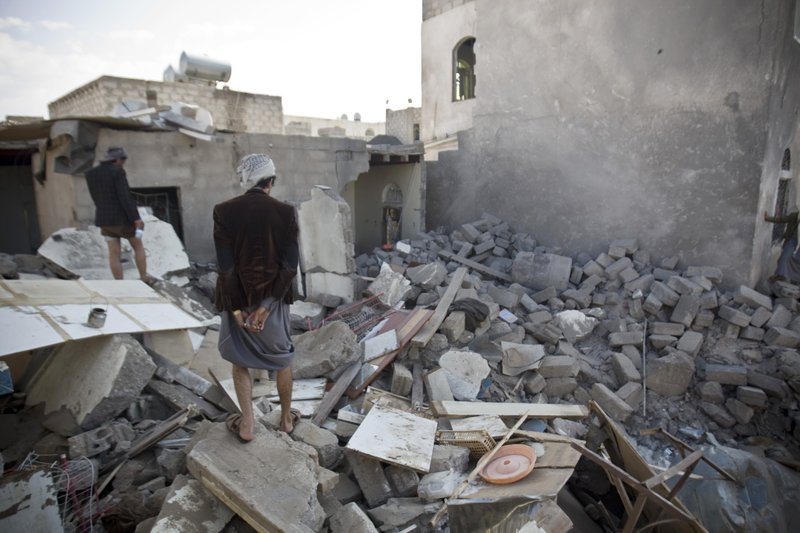SANAA, Yemen -- Yemeni civilians expressed fear and anger over a Saudi-led bombing campaign against Shiite rebels Tuesday, the sixth day of the fighting. International aid organizations denounced the high civilian casualties from the strikes and violence roiling the country.
Most residents of the capital, Sanaa, sought shelter, while some took to the rooftops in anger or frustration, firing automatic rifles skyward, toward the roar of warplanes. Schools, universities, government offices and most shops were closed. Few cars ventured onto the deserted streets.
"We haven't slept -- one child screams and a second cries," said Mustafa al-Ahmadi, a father of eight, who said his family seeks shelter in the basement when close explosions rock the house. "Once it's quiet we return to our room, but the minute we step in, a second explosion rocks the house, so we return to the basement. This is how we spend the night, running back and forth."
Aircraft late Monday and early Tuesday repeatedly bombed a weapons depot in the southern Faj Atten neighborhood, sending fire into the air and shaking windows for miles around.
Officials from all sides said strikes hit the city's so-called security belt of army camps surrounding the capital, some of which stored ballistic missiles. Those camps are held by Shiite rebels known as Houthis or their allies, military units loyal to former President Ali Abdullah Saleh.
"We ran to the shop to take shelter after 1 a.m. because of airstrikes on the mountain," said Abdel-Rahman al-Hamidi, who lives near a rebel camp that was returning fire at warplanes.
The campaign by the Saudi-led coalition, made up mainly of Sunni Arab states, aims to weaken the Iranian-allied Houthis, who have overrun much of the country with the help of Saleh's loyalists and forced Yemen's current president, Abed Rabbo Mansour Hadi, to flee abroad.
The United Nations human-rights office in Geneva said that in the past five days, at least 93 civilians have been killed and 364 wounded in five Yemeni cities engulfed in the violence, including Sanaa. The overall figures are likely much higher, and it was not immediately clear whether the casualties cited by Geneva referred to just airstrikes or included fighting between Yemen's warring factions.
The Saudi-led coalition says rebels have set up positions near civilians but that it is doing its best to avoid civilian casualties.
Overnight Monday and into the early hours of Tuesday, the coalition also struck in and around the cities of Taiz, Ibb, Shabwa, Dahle and Aden, according to Yemeni military and security officials. They spoke on condition of anonymity because they were not authorized to talk to the media.
The southern port city of Aden, a stronghold of Hadi supporters, has been shaken for days by coalition strikes and by fighting between Hadi loyalists and Houthi-Saleh forces holding several positions in the city.
Along with warplanes, warships and naval artillery were striking Houthi and pro-Saleh forces marching on Aden, trying to prevent them from reaching the city.
Hadi had declared Aden the temporary capital of his government after he was forced to flee Houthi-controlled Sanaa. Last week, Hadi left the country for a summit in Egypt as fighting in Aden heated up.
Meanwhile, Iran said it sent an aid shipment to Yemen, according to the official IRNA news agency -- Tehran's first such delivery since the airstrikes started. The aid contained 19 tons of medicine and medical equipment and 2 tons of food provided by the Iranian Red Crescent, IRNA said.
The agency reported that the aid was delivered by air early Tuesday but did not say where the cargo landed. The coalition has bombed a number of rebel-held airports and says it fully controls Yemen's airspace.
The conflict in Yemen marks a major escalation in the regional struggle for influence between Saudi Arabia and Iran. Critics of the Houthis have said they are an Iranian proxy. Iran has provided aid to the rebels, but both Tehran and the Houthis deny it has armed them.
Saudi Arabia and Iran also back rival sides in Syria's civil war.
From Riyadh, Saudi Foreign Minister Prince Saud al-Faisal insisted that Yemen's security was integral to the Gulf Arab region's overall security.
"We are not warmongers, but if the drums of war call for it, we are prepared," al-Faisal said in a speech to the consultative Shura Council. "The Houthi militias and the former president [Saleh], with Iranian support, insist on messing in Yemen."
Information for this article was contributed by Nasser Karimi, Geir Moulson, Maggie Michael and Brian Rohan of The Associated Press.
A Section on 04/01/2015


